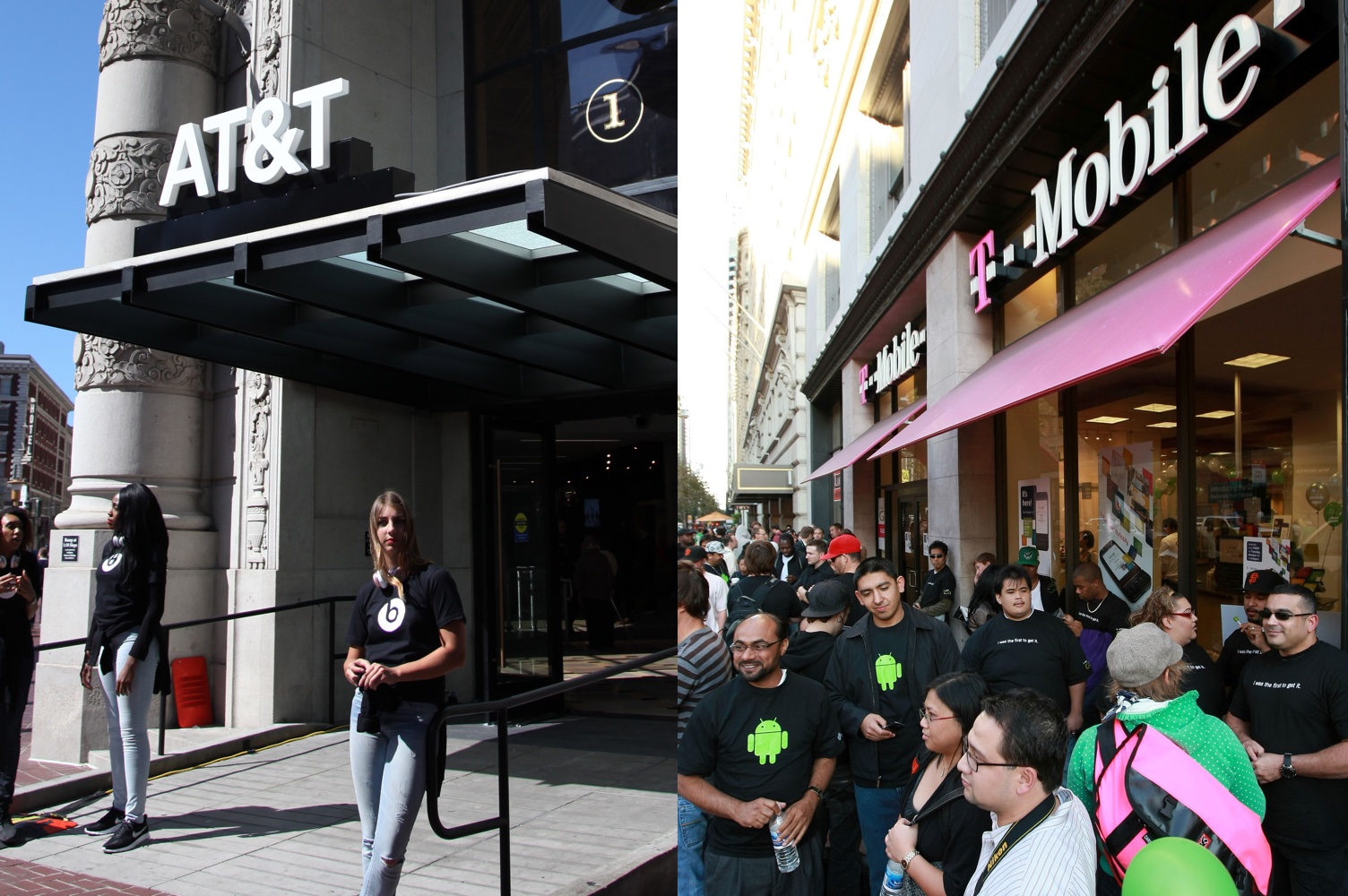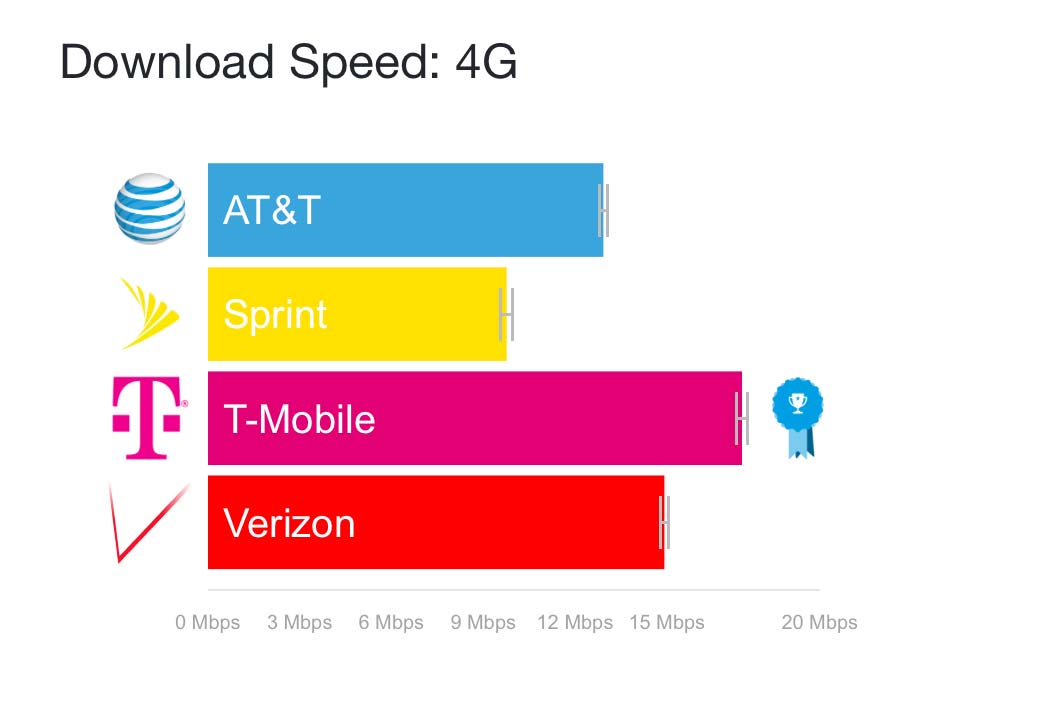Unlimited Plans Slowing Down AT&T, Verizon (Report)
Network testing firm OpenSignal says 4G download speeds have gotten slower for AT&T and Verizon. And it thinks congestion from unlimited data plans is to blame.
Unlimited data plans at Verizon and AT&T have freed subscribers of those wireless carriers from having to worry about their dwindling data allotment every time they streamed a show on Netflix. But it's also slowed down the 4G speeds on those wireless networks, a testing firm has concluded.

OpenSignal has published its regular look at wireless network performance and found that 4G speeds dropped for both AT&T and Verizon since those carriers rolled out unlimited data plans in February — dramatically in Verizon's case. Sprint and T-Mobile, which have had unlimited options for longer, both saw their performance pick up over the last six months.
In fact, Verizon's loss has been T-Mobile's gain. Not only can the Uncarrier lay claim to being the fastest network by OpenSignal's testing, it also swept the testing firm's awards for network availability and latency. That strong result follows an OpenSignal report from February that found T-Mobile and Verizon virtually tied in network speed.
MORE: The Best and Worst Phone Carriers
T-Mobile and Verizon remain in a very competitive battle for network supremacy, OpenSignal stressed in its latest report released today (Aug. 2). But the test firm found T-Mobile making clear strides in 4G speed and availability while Big Red's 4G download speed took a big step back.
OpenSignal measured Verizon's average 4G download speed at 14.9 Mbps in this report — a 12 percent drop from the 16.9 Mbps speed it tallied in OpenSignal's February report. That timing's significant as Verizon announced a new unlimited plan in February after years of only offering tiered data plans to new customers.
AT&T, which added unlimited data plans of its own to match its rival carriers, also saw its speed drop, though not as dramatically. OpenSignal says AT&T's average 4G download speed fell to 12.9 Mbps during this test period from 13.9 Mbps earlier this year.

If there's any doubt that network congestion caused by subscribers taking advantage of their now limitless data is the culprit, OpenSignal noted that Verizon and AT&T have seen drops in speed in each month since they rolled out unlimited plans.
Sprint and T-Mobile meanwhile both saw their 4G speeds tick up during the same period. Sprint rose to 9.8 Mbps from 9 Mbps, while T-Mobile's average reached 17.5 Mbps, up from 16.7 Mbps. OpenSignal theorizes that those carriers have had longer to absorb the extra traffic brought on by unlimited plans. T-Mobile started phasing out tiered data plans in 2016, for example, and it's offered unlimited data as an option for several years.
OpenSignal bases its results on data collected from user smartphones. The numbers in this latest report reflect data collected from 172,919 users between the end of March and the end of June.
T-Mobile can also point to big gains in 4G availability, which OpenSignal measures as the percentage of time users on a network get 4G service no matter where they happen to be. T-Mobile became the first carrier to pass the 90 percent mark for 4G availability, topping Verizon by 90.9 percent to 89.8 percent.
All four major carriers saw gains in availability, though, with Sprint registering the biggest improvement. (It went to 81.6 percent, up from 76.8 percent in the last OpenSignal report.) All four carriers now offer 4G availability more than 80 percent of the time, OpenSignal said.
After OpenSignal published its report today, T-Mobile, which rarely passes up the chance to dunk on its rivals, put out a statement emphasizing Verizon's drop in speed. For its part, Verizon highlighted OpenSignal's findings in 32 metro areas, where Big Red won the 4G speed award outright in six markets while sharing honors in 24 others; T-Mobile won in four markets, and shared the title in 25.
In our testing of 4G network speed earlier this year, Verizon finished on top, though much of our testing was conducted before the carrier introduced unlimited data plans. T-Mobile placed second in our survey, ahead of AT&T.
OpenSignal's report comes out a week after RootMetrics released its own survey of network performance. That third-party testing firm gave the nod to Verizon, while noting that AT&T had improved considerably during the first half of the year. Verizon, which topped RootMetrics' semiannual survey for the eighth consecutive time, noted that those tests were also conducted after it had introduced unlimited plans.
Sign up to get the BEST of Tom's Guide direct to your inbox.
Get instant access to breaking news, the hottest reviews, great deals and helpful tips.
Editors' Note: This article was originally posted at 1 a.m. ET. We updated at 7:15 p.m. ET with additional comment from T-Mobile and Verizon.
Philip Michaels is a Managing Editor at Tom's Guide. He's been covering personal technology since 1999 and was in the building when Steve Jobs showed off the iPhone for the first time. He's been evaluating smartphones since that first iPhone debuted in 2007, and he's been following phone carriers and smartphone plans since 2015. He has strong opinions about Apple, the Oakland Athletics, old movies and proper butchery techniques. Follow him at @PhilipMichaels.
-
Adam_262 not sure where you test sprint but here in cleveland its more like 40 to 50 mbps here, these numbers are WAY off i can get 17mbps and higher with a BAD signal here. Im getting ready to unsub from this page the information is terrible and the reviews are way off the mark.Reply

